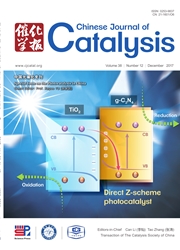

 中文摘要:
中文摘要:
随着化石能源的日益减少,从木质生物质获得能源、燃料和化学品变得至关重要.木素是木质生物质的第二大主要组分,但是目前远未得到充分利用.随着对木素结构的充分认识和相关催化科学技术的发展,由木素制得大宗燃料或精细化学品,特别是芳香类化合物显示出越来越具有技术和经济可行性.由于木质素大分子中复杂的C–O和C–C连接,先研究模型物的断裂机理并同时考虑从木素模型物小分子迁移到木质素大分子的问题,然后设计出合适的催化材料并开发出可行的工艺过程,这条技术路线看起来更具有可行性.近年来,几种均相或非均相多氧金属盐(Polyoxometalates(POMs),或称杂多酸)用于降解木素或者木素模型物,但是β-O-4醚键断裂的氢解还是酸解机理及其竞争合作作用尚不清晰.我们在几种多氧金属盐(POMs)的催化下研究了β-O-4模型物2-phenoxyacetophenone(2-PAP)在以无水乙醇作为供氢溶剂体系下的催化断裂机理和行为.结果表明,随着无水乙醇溶剂处理温度的提高,溶剂的供氢能力增强.酸性催化剂的加入提高了溶剂供氢能力.原因是催化剂的酸性改变了乙醇自氧化还原反应的平衡,使平衡向生成乙醛并释放出活性氢的方向进行.我们还发现,Cs-PMo的氧化还原性,对促进活性氢的释放起更大的作用.2-PAP反应底物的加入消耗了活性氢,从而促使乙醇自氧化还原平衡向右移动.在酸性催化剂的作用下,2-PAP的转化裂解可以按照氢转移机制或酸催化的氧鎓离子机制进行.大部分转化反应按照哪个机制进行,取决于所采用体系的供氢能力和酸强度/数量的竞争关系,大部分反应将屈从于占竞争优势的机制.在强供氢及转移能力占优势,而酸强较低酸量较少时,反应主要按氢转移机制进行.在酸强很强且数量较多,反应将主要按酸催化氧鎓离子机制进行.Cs-PMo这个拥有酸性和强氧?
 英文摘要:
英文摘要:
Production o f aromatics from lignin has attracted much attention. Because of the coexistence of C-O and C-C bonds and their complex combinations in the lignin macromolecular network, a plausible roadmap for developing a lignin catalytic decomposition process could be developed by exploring the transformation mechanisms of various model compounds. Herein, decomposition of a lignin model compound, 2-phenoxyacetophenone (2-PAP), was investigated over several ce-sium-exchanged polyoxometalate (Cs-POM) catalysts. Decomposition of 2-PAP can follow two dif-ferent mechanisms: an active hydrogen transfer mechanism or an oxonium cation mechanism. The mechanism for most reactions depends on the competition between the acidity and redox proper-ties of the catalysts. The catalysts of POMs perform the following functions: promoting active hy-drogen liberated from ethanol and causing formation of and then temporarily stabilizing oxonium cations from 2-PAP. The use of Cs-PMo, which with strong redox ability, enhances hydrogen libera-tion and promotes liberated hydrogen transfer to the reaction intermediates. As a consequence, complete conversion of 2-PAP (〉99%) with excellent selectivities to the desired products (98.6% for phenol and 91.1% for acetophenone) can be achieved.
 同期刊论文项目
同期刊论文项目
 同项目期刊论文
同项目期刊论文
 期刊信息
期刊信息
